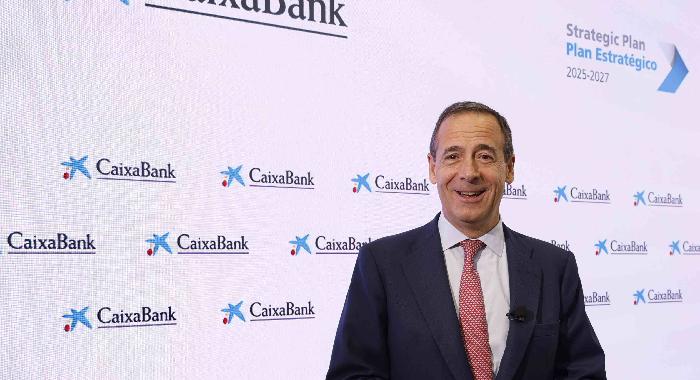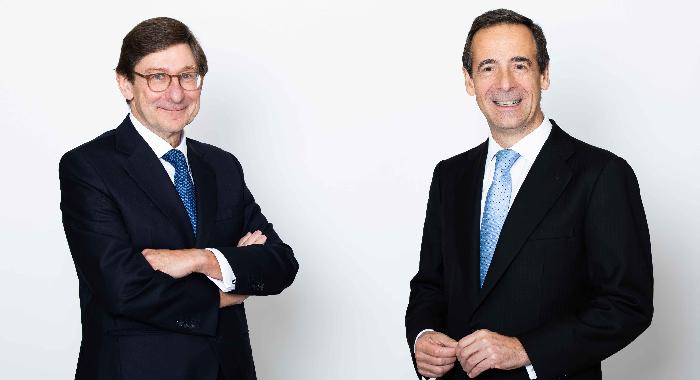
Ecova, a project driven by three students from the CEU Sant Pablo University in Madrid, with the aim of reusing water in homes, has won the fourth imaginPlanet Challenge. This programme, organised by imagin, aims to encourage the entrepreneurial spirit of young people and generate business ideas that help to combat climate change.
Through this initiative, imagin, the digital services and lifestyle platform promoted by CaixaBank, offers training and tools to a generation of young people with environmental awareness and entrepreneurial concerns so that they can develop projects capable of generating a positive impact on the planet.
Students Fátima Sánchez de Pedro, Marta Pedernal Marigómez and Guillermo Yegro Dawig, from the CEU Sant Pablo University in Madrid, have developed Ecova, an integrated system designed to capture, treat and reuse greywater generated in homes. The system they have designed is based on the premise that the water used in the shower is still of sufficiently high quality to be reused for other purposes, such as toilet flushing. Water is redirected from the siphon canister (a small tank that acts as a central siphon for each of the devices - bathtub, shower, bidet, washbasin, etc. - connected to it) to the filtration system, thus removing soaps, grease and other chemical residues that can damage the toilet, after which it is pumped to the water tank, which feeds the toilet cistern.
The winning team will enjoy a stay in Silicon Valley, specifically at the Imagine Creativity Center, led by entrepreneur Xavier Verdaguer. The members of the Ecova team will spend ten days participating in an incubation programme for their project and visiting companies such as Netflix, Google, HQ, Instagram, X or IDEO, among others. In addition, they will receive training sessions at Stanford and Berkeley universities. They will also take part in a road trip from Los Angeles to San Francisco, where they will visit the natural parks of the Grand Canyon, Yosemite, Mammoth Lakes and Death Valley.
Moreover, Ecova’s promoters will become part of the Alumni community, through which imagin continues to support the growth of the projects that have taken part in the imaginPlanet Challenge, and all the participating teams can stay involved with the programme. The alumni community allows imagin to continue supporting the development of these projects, promote participants' future careers and foster interaction between all those involved in the imaginPlanet Challenge.
Ecova reached the final round, held in Madrid, together with the following projects:
- Protein Bar-Ley, a team from the Pablo de Olavide University in Seville with an initiative to produce protein bars made from barley bagasse.
- Ingenia, from the Universitat Politècnica de València, which, through Biotank, is committed to providing an algae engine ecological solution, designed to absorb CO2 in highly polluted areas.
- Tengui, from the University of Girona, presented an app that allows you to find any product you need in a nearby shop through Artificial Intelligence, reducing the impact of online shopping.
- Evolution, from the University of Navarra, with Th(re)ad, an 100% recycled yarn made from textile waste and unused clothing.
- Agro4Data, a team from the Carlos III University of Madrid that devised software to more efficiently manage the resources used during farming.
- 3toC, from the Universitat Politècnica de Catalunya, which presented a mask designed for urban cyclists that incorporates information on pollution.
- Aloha, from CIFP Virgen de Las Nieves de La Palma, which has developed an app to connect tourists with locals, offering experiences and accommodation.
- Sitio, which from the Universidad Rey Juan Carlos de Madrid offers a rental solution for owners of parking spaces to users who need parking.
- Clean Forest, which from the University of Vigo (ESEI, Ourense) proposes a platform for buying and selling carbon credits based on blockchain that connects landowners with users interested in reforestation.
More than 8,000 participants in the first editions
The winning project of the fourth imaginPlanet Challenge was chosen from among the 447 teams registered in this call, which featured more than 3,000 young participants. As a new feature of this year's edition, the age limit for participation has been lowered from 18 to 16, and both university students and students from vocational training centres were eligible to participate.
Throughout its four calls, more than 8,000 young people have already participated in the imaginePlanet Challenge. The projects chosen in the first edition were ecoDeliver and Kidalos, focused on making the parcel transport and toy sectors more sustainable, respectively. In 2022, recognition went to Atom, a hydrogen fuel generation and storage project, while last year's winner was Utopia, an initiative to detect and stop the spread of fires through artificial intelligence. Several of them have already been incorporated as companies and have closed several investment rounds.
imaginPlanet, a commitment to sustainability
imaginPlanet Challenge is one of the initiatives that imagin, through imaginPlanet, develops to have a positive impact on the planet and on society as a whole. Through imaginPlanet, initiatives are launched in support of social and environmental causes, both internally and promoted by individuals or organisations supported by imagin.
imagin's sustainability plan means that the entire business model and its entire organisation are committed to criteria of coherence, social and environmental commitment, transparency and innovation.
In addition, imagin is committed to fostering the financial inclusion of young people by positioning itself as the key point of contact between young people and their financial resources, playing an essential role in the financial education of our community. They also offer training and practical advice on everyday finance-related topics.





